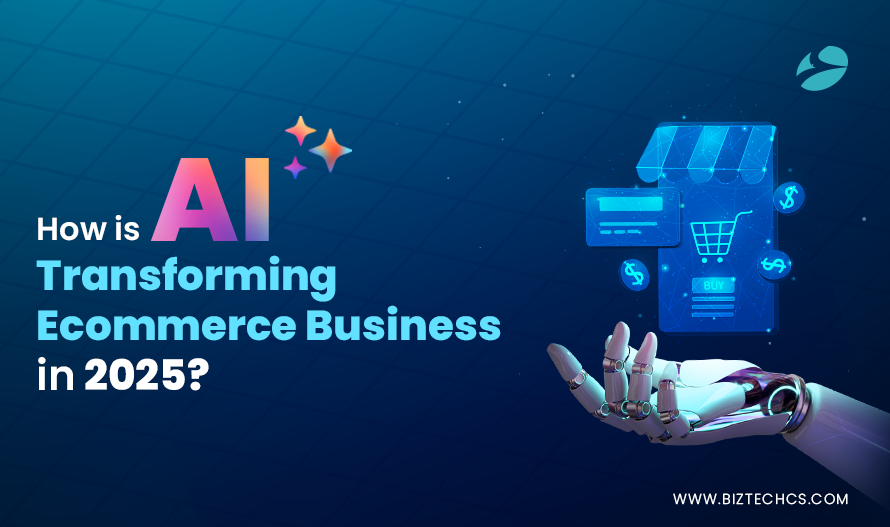AI in eCommerce: How Artificial Intelligence Transforms Online Shopping
27 Jan, 2025
10 min read
27 Jan, 2025
10 min read
Table of Content

Imagine if your shopping cart recommended what you should order before considering it yourself. This is the reality AI is going to build in eCommerce by 2025. With product suggestions and customer service through chatbots to service alerts, AI is revolutionizing how businesses interact with clients.
According to recent reports, this kind of personalization can raise sales up to 15%. With this eCommerce AI market currently estimated to be growing at a Compound Annual Growth Rate of 26%, the industry is even more dynamic than before. Leveraging AI development services allows businesses to implement these transformative solutions more effectively, staying ahead in the competitive landscape.
In this blog post, readers will learn how AI is revolutionizing the future of online shopping.
Customers can upload pictures and get results of similar products in real-time using a visual search that leverages Artificial Intelligence. For instance, a user can upload an image of a dress, and the application then suggests products that are similar or similar enough.
Augmented reality improves the shopping experience because customers can see how a dress fits or how a piece of furniture would look in their homes. These features help make decisions, minimize returns, and increase customer satisfaction.
Voice-activated shopping utilizes smart assistants such as Alexa or Google assistant to complete a shop. One can be able to order products or check for deals by using simple commands using the voice command system.
AI also ensures product listings are well positioned to gain high rankings in voice search, making it easier to find what they are looking for. This increases the visibility of products and enhances the convenience of shopping.
Chatbots use artificial intelligence to answer questions, address complaints, and offer assistance anytime. Such chatbots can make the process of shopping more effortless for users by enabling them to search for products through natural language.
They also consist of order updates about the status of an order, returns, and refunds to enhance post-purchase communication. This not only fosters trust with the client while at the same time improving the clients’ satisfaction levels, but it also decreases the company’s cost of support.
AI can identify illegitimate patterns in transactions to reduce payment fraud and customer data privacy. It processes transactions in real-time and declines any transaction that looks suspicious.
Behavioral biometrics and anomaly detection add more layers to protecting a customer’s accounts. This brings about secure shopping conditions thus helping in the prevention of loss both for the business as well as for the clients.
Personalized recommendations in e-commerce apply machine learning, collaborative filtering, and content-based filtering in e-commerce. These technologies use user trends, preferences, and engagement data to recommend products or services.
This helps to provide more personalized experiences to customers in terms of the content displayed on websites and emails. It also assists cross-sell and up-sell techniques by defining other related products that the same customers can purchase. In the long run, this enhances customers’ satisfaction level, leading to increased sales.
Chatbots and virtual assistants use natural language processing (NLP) and conversational artificial intelligence. They can actually handle customer queries and concerns that are common issues so as to reduce the workload of the care team. They may be used to assist customers in their purchasing experience so that they have an easy time while shopping.
This way, they can respond appropriately and within less time because they understand the customers’ intent behind the interaction. This enhances customer interaction and prevents overwhelm on the human support teams.
Voice commerce is a much broader concept than voice shopping, and everybody is already familiar with Alexa and Google Assistant, which use voice recognition and NLP to let people shop. Through voice commands, customers can search for products, put items in the cart, and buy them. This technology makes shopping easier when undertaken by users of mobile devices, significantly enhancing the overall user experience in the eCommerce industry.
Voice commerce also makes shopping more accessible for persons with disabilities since it breaks barriers such as door huddles common in skills. By offering a touchless and quite comfortable way of shopping, it represents a revolutionary step forward in the ecommerce industry, catering to diverse user needs.
Programmatic advertising and predictive analytics are the main components of artificial intelligence advertisements. These tools assist in developing highly relevant advertisement appeals for distinct customer groups. Predictive analysis helps in the efficient spending of money on advertisements and getting more out of it.
Businesses can also create audiences of people who are similar to their customers in more efficient ways to get customers. This results in improved campaigning and better chances of the desired conversion.
AR and VR in e-commerce adopt the use of artificial intelligence tools to establish augmented reality and virtual reality. Some of the benefits include the ability to make a real sense of measurements of products that can be used in communication such as clothes or even accessories, without the necessity of having to purchase to be able to wear the product.
AR assists the users in implementing the products in real environments such as a chair in a living room. These technologies also enhance the experience of shopping to be more engaging to the general customer. They also aid in decreasing the rates of returns since clients will have a clear picture of the product they are buying.
Integrating AI tools into your eCommerce operations can significantly enhance efficiency, personalize customer experiences, and boost sales. Here are ten AI tools that can help elevate your business:
It is a complete AI suite available in the Shopify ecosystem. It develops product descriptions, optimizes images, and deals with customer communication. Perhaps the most notable of these is Sidekick, a retail AI assistant designed to help stores with daily tasks. It offers basic solutions to everyday e-commerce problems. In fact, its applicability ranges from organizing inventory to helping with the processing of orders. They often contemplate for those who want optimum efficiency without going for bulk handling.
Tidio is an AI chatbot for customer services. Chatbots and Live Chat solutions for immediate customer care assistance are provided. They respond to questions, recommend products, and offer assistance on cart abandonments. This is because it makes shopping easier for the customers and leads to more sales. It is crucial for enhancing the customer experience. It is also essential for businesses to be able to communicate with their target shoppers, including those at some of the peak hours, such as the late afternoon, evening, or even during crowded weekends.
Jasper is designed to create content for e-commerce purposes only. It creates ramp pages, blogs, and social media posts. It also gets used to create marketing emails that appeal to the appropriate population. It is speedy, efficient and generates good text. This is particularly suitable for businesses that operating a brand marketing strategy. It means that less time and energy are required to create content.
OptiMonk works on targeting website visitors or customers. Its AI generates incoming experiences such as pop-ups that are specific to the reader and A/B testing. These tools effectively manage customer relations and boost sales. This makes it possible for businesses to transform the onlookers into consumers of their products. It enhances the sales chances with accurate targeting. So, it is ideal for websites that want to increase conversion rates and engage visitors in other ways, not just through the main call to action.
In simple terms, Prisync is an artificial intelligence-based pricing optimization software. It can track the prices set by competitors in real-time and then adapt to change the prices of products accordingly. This means that your business establishes a competitive edge in the market. It is perfect for the purpose of making a good extra buck – without any physical involvement. You remain relevant to pricing trends hassle-free. It is a wise approach to the existing and emerging challenges that retailers experience particularly in online markets.
ViSenze is an Artificial Intelligence search and image identification engine. It allows customers to search products by images and not by keywords. This makes the finding of products easier and overall user satisfaction increases. It’s especially helpful for fashion and lifestyle industries, particularly for niche and luxury brands. Finding items is easier, resulting in higher chances of converting the customers. Grocery shopping is made easy and fun.
Actually, Bazaarvoice incorporates the use of Artificial Intelligence to mine through customer reviews to get information. It assists organizations in enhancing their goods and services offered to clients and consumers due to feedback received. To manage this aspect, the platform assures consumers that the reviews are genuine and do not contain misleading information. The findings from the reviews also assist in enhancing marketing strategies since they provide insights into the most effective approaches. It is beneficial when trying to identify the customers’ needs more effectively. Finally, it encourages customer loyalty and subsequent purchases.
ClickUp is a tool for project management that incorporates elements of artificial intelligence. It cuts across the processes, efficiently assigning tasks and enhancing teamwork among the personnel. This, in turn, improves the efficiency of e-commerce-related activities or teams. It facilitates project organization and timelines. Some of the benefits include the opportunity for teams to concentrate on development rather than doing unproductive work. It is indispensable for refined working on sophisticated processes in organizations.
Runway is an Artificial intelligence-powered online video editor. It also helps businesses create professional marketing videos quickly. This is excellent for advertising and sales or getting people more engaged with the content they view. The tool is very effective and easy to use by anyone, even if he or she is not very computer literate. It reduces the time spent on editing while creating quality content. Entrepreneurs and companies get more opportunities to utilize video marketing.
Surfer AI mainly works on optimizing content for search engine ranking. It ensures that your website is listed at the top of search engines. The tool enhances visibility, thus increasing traffic from the various social media platforms to your store. It is intended for producing enhanced blog posts, webpages, and articles for SEO. This brings more potential buyers into the market. It is one of the most effective strategies for any organization seeking to improve its internet presence and sales.
It is well known that AI requires high-quality data, and its availability in significant quantities is critical for obtaining valuable conclusions. In e-commerce, issues of inferior data or lack of data can result in wrong product recommendations, wrong customer profiling, and missed opportunities. For example, it can lead to wrong directions in inventory management or in pricing policies due to the presence of inconsistent or out-of-date information. To eliminate these errors, allocating more resources to data collection, sanitation, and validation is crucial. AI may never reach any level of promise if data challenges are unmet.
Managing customer data is a great responsibility and entails major privacy risks, given enhanced rules and regulations such as the GDPR and the CCPA. The following lesson is that e-commerce businesses must protect personal information to sustain customer trust. Other risks include legal consequences and loss of reputation in the event of wrongdoings towards sensitive data. To address this, companies should use strong encryption methods and be clear about collecting and using customer data. Complying with regulations is not optional—it’s vital for building long-term customer relationships.
Developing AI systems isn’t always cheap because procuring sophisticated tech, cloud services, and recruiting talent requires money. Small to medium-sized enterprises in the e-commerce sector commonly find the expense hard to justify. Selecting and initiating relatively simple and more containable projects can be advised against economic control and the opportunity to show positive outcomes more quickly. The use of cheap AI tools or platforms can also help to ease initial costs while having value to offer. However, as time passes and when these benefits are realized, it becomes easier to invest more in AI.
Evaluating the impact of AI in e-commerce can be challenging because the returns of specific approaches may be felt over the long term. For example, personalization enabled by artificial intelligence might increase customer loyalty, which can only increase revenues in the long run. It is possible to establish specific goals, such as higher conversion rates or lower cart abandonment, to simplify determining ROI. Procuring quantifiable parameters helps to avoid difficulties in explaining the need to invest. Performance evaluations enable organizations to identify whether the applied AI solutions are adequate for their business initiatives.
When it comes to the use of AI in eCommerce, it is very evidently progressive. Customers are benefiting from recommendation services offered by AI-enhanced spaces. Algorithms study consumers’ behaviors, and the latter offers them products they will likely purchase. This leads to convenience in shopping and an increase in sales. It is proven that chatbots are gradually becoming intelligent and efficient in handling customer queries.
Computational technologies are bringing seismic changes to the way companies manage inventories. Promoters identified some benefits of predictive analytics, including predicting the demand for a retailer’s goods, hence no overstocking or stockouts. One disadvantage of automation is that people make many mistakes, eliminate such faults and reduce the time taken. Real-time data provides a significant advantage in decision-making. This results in better operational outcomes and reduced costs.
AI also improves the aspect of pricing strategies. Dynamic pricing involves setting different prices for a product or service depending on the demand and competitors’ activity in the market. This means that retailers can get the best returns without having to involve their hands in one way or the other. AI also helps in pricing – products must be priced in a way that is affordable but makes money simultaneously. Customers need fair and timely offers.
AI is shaping the future of fraud detection, and it is more advanced than before. AI watches for any possible signs of foul play in transactions. It alerts them first of fraudulent transactions, thus safeguarding customers and different businesses. This also develops confidence in online shopping. Security measures are enhanced without making any compromises to people’s convenience.
The future of eCommerce is in AI-driven marketing. Organizations employ AI to market products and services specifically to targeted clients. It also makes campaigns more accurate and cost-effective. Market analysis and customer feedback are parsed using AI tools. This helps brands to remain relevant, if not more prominen,t in a quickly evolving market environment.
In 2025, AI will progress and enhance the eCommerce market and shopping experiences while optimizing companies’ operations. From advanced recommendation engines to intelligent chatbots and predictive analytics, the possibilities are endless.
Leveraging AI is no longer a luxury but a necessity to stay relevant in the competitive market and drive innovation.
As a premier provider of eCommerce development services, BiztechCS aims to offer tailored solutions that meet your specific requirements. With expert teams, we can seamlessly integrate AI into your current system, ensuring your business thrives in this new age of eCommerce transformation.
BiztechCS helps businesses integrate AI solutions to enhance personalization, automate operations, and improve decision-making. Their expertise in custom AI tools and platforms supports growth and innovation in the eCommerce sector.
By 2025, AI-driven personalization, voice commerce, and augmented reality shopping experiences are expected to dominate eCommerce. Advances in predictive analytics and autonomous delivery systems will further transform the industry.
AI is revolutionizing eCommerce by enabling personalized shopping experiences, smarter product recommendations, and dynamic pricing. It also enhances inventory management, fraud detection, and customer service through automation and predictive insights.
AI can automate repetitive tasks like order processing, inventory updates, and chat-based customer support. It also powers personalized email marketing campaigns and predictive analytics for better sales forecasting and decision-making.
Generative AI is used to create content such as product descriptions, ad copy, and personalized messages. It also helps in generating visuals for marketing and creating unique user experiences like virtual try-ons or dynamic website designs.
Machine Learning helps analyze customer data to offer tailored recommendations, predict buying behavior, and detect fraud. It also optimizes logistics, pricing strategies, and marketing efforts by identifying patterns and trends in real-time.
AI enables highly targeted advertising by analyzing customer data and behavior to deliver relevant ads. It also supports email campaigns, social media optimization, and A/B testing for better engagement and conversions.
AI improves customer service by powering chatbots that provide instant responses and 24/7 support. It also uses sentiment analysis and predictive models to resolve customer issues faster and enhance their overall experience.
Businesses can ensure the accuracy of LLMs by regularly training them on updated, domain-specific data and monitoring their outputs. Human oversight and feedback loops are essential to correct inaccuracies and maintain relevance.
AI drives growth in eCommerce by improving efficiency, reducing operational costs, and enhancing customer satisfaction. It also supports scalability and innovation through better data utilization and automation.

Artificial Intelligence (AI)
47
By Uttam Jain
19 Dec, 2025

Artificial Intelligence (AI)
118
By Uttam Jain
10 Dec, 2025

Artificial Intelligence (AI)
211
By Afzal Qureshi
09 Dec, 2025